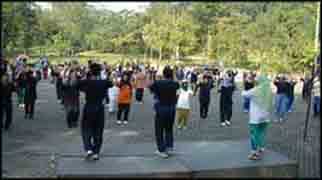
Introduction
Definition of exercise:
A form of physical activity or recreation usually carried out repeatedly within a specified time to increase the level of fitness and health.
Lack of exercise
Can lead to:
- Obesity; 1 out of 4 children in Malaysia was obese.
- Type 2 diabetes mellitus.
- Increased risk of developing chronic adult diseases like heart disease and stroke.
Benefits of exercise
- Improves muscular strength and endurance.
- Improves muscle tone and body posture.
- Helps build healthy bones.
- Improves joints flexibility.
- Helps maintain a healthy weight.
- Reduces anxiety and stress.
- Reduces the risk of developing chronic adult diseases, e.g. diabetes, heart disease, stroke.
- Increases heart and lungs fitness.
- Releases the hormone ‘endorphin’ which increases the sense of well-being.
Intensity of exercise
Aerobic exercise is excellent for children, e.g.:
- swimming
- football
- tennis
Children who are currently inactive should start with 30 minutes of exercise daily and gradually increasing it to 1 hour.
Exercise safety
- Use comfortable, appropriate clothing and foot-wear.
- Use safety devices e.g. helmet, goggles, braces, guard, pads etc.
- Avoid exercising within 2 hours after a meal.
- Drink adequate water before and at the end of the exercise to replace the water loss in sweating but avoid taking carbonated drinks.
- Avoid exercising in non-conducive environments e.g. too dark, hot weather, polluted air.
- Use normal shower and only after the body has cooled down and not sweaty.
- Use reflector on the suit to jog early in the morning, at dawn or at night.
- Jog on the opposite direction of the traffic. Avoid exercising in heavy traffic areas.
Warming up before exercise
Reasons:
- To warm up the muscles.
- Increase blood flow to the working muscles.
How to warm up
Three parts of a good warm-up:
- Warm the muscles that are going to be used e.g. jog 2 – 3 minutes, swim slowly, cycle slowly.
- Stretching (15 minutes) – hold each stretch for 10 – 20 seconds. Stretch until the muscles feel tight, but don’t overdo it, because it will cause injury to the muscles.
- Specific exercise – practice skills e.g. kicking, throwing or other high-energy activities.
Cooling down after exercise
Reasons:
- To relax the muscle.
- Get rid of waste products.
- Improve flexibility.
How to cool down:
- Slowly reduce the high-level activity.
- Go through the same stretching exercise.
| Last reviewed | : | 26 April 2012 |
| Content Writer | : | Dr. Baizury Bashah |
| Reviewer | : | Dr. Fuziah bt. Md. Zain |







